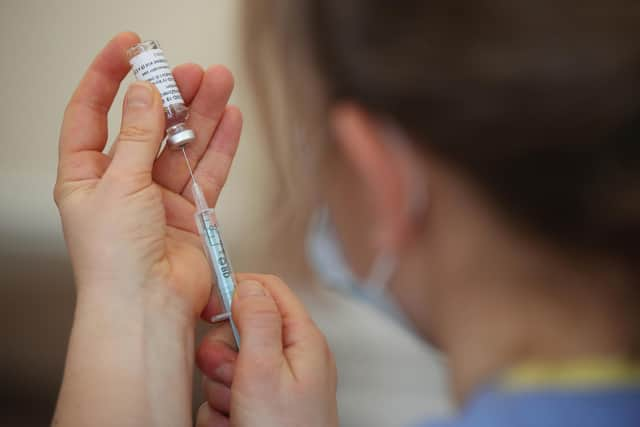Covid vaccine: UK’s Chief Medical Officers deserve our trust over inoculating children – Professor Harry Burns
Throughout the pandemic, scientific advice has been clear about vaccination. Getting as many people as possible vaccinated increases immunity in the population and dramatically slows the spread of the virus. That advice worked.
Hospitalisations and deaths slowed as more people were vaccinated. Now, the next people to be vaccinated are adolescents in the 12-17 age group.
Advertisement
Hide AdAdvertisement
Hide AdHowever, the Joint Committee on Vaccinations and Immunisations has not recommended they should receive the vaccine unless they have conditions that put them at risk of severe Covid-19 or are close contacts of people who have problems with their immunity.
Why? Young people who get Covid are not usually badly affected by it and JCVI has assessed that the risks of vaccination in young people might outweigh the benefits to the individual receiving it.
On the other hand, a case can be made that having young people vaccinated might bring benefit to the wider population. How have other countries tackled this issue?
Italy has been vaccinating adolescents in preparation for the new school year. Earlier in the summer they reported that 35 per cent of 12-19-year-olds had received the first dose while 18 per cent had received both.


The Netherlands began vaccinating the over-12s in July. In the US, the Centres for Disease Control has recommended all over-12s be vaccinated and recently reported that 40 per cent of 12-17-year-olds have had at least one dose.
Germany, however, decided they had insufficient data on possible long-term effects of vaccination and recommended this for 12-17-year-olds only if they were at risk of serious illness. Similarly, Sweden is vaccinating 16-18-year-olds but children in the 12-16 age-group are only getting it if they are in at risk. So far, there is no clear international consensus.
The JCVI is an independent body advising the government on immunisation programmes. Clearly, it needs to assess the risks and benefits of a vaccine to those receiving it.
Public health, while it has a responsibility to protect individuals from risks to their health, also needs to be conscious of the factors affecting the health of the wider population.
Advertisement
Hide AdAdvertisement
Hide AdIt is that wider population impact of Covid infection that might be helped by immunisation of 12-17-year-olds. In the past week, an average of around 6,000 people in Scotland have had positive tests each day.
The virus is clearly spreading widely and controlling its spread is vital. Thankfully, the number of hospitalisations and deaths have declined. Those who have been vaccinated are less likely to develop serious illness but might still be infected and pass the virus on. They might still develop long Covid.
There is evidence that the vaccine’s effectiveness is decreasing with time so more adults might become susceptible to serious illness even after vaccination.
While the virus is circulating, new strains can emerge against which current vaccines might be ineffective. A rising risk of serious illness and increasing mortality might be the result.
The decision on vaccination of young people is being left to the UK’s Chief Medical Officers. They must balance the risks and benefits to the whole population as well as to the 12-17-year-olds of vaccinating them. I am confident they will make the right decision.
Sir Harry Burns is a Strathclyde University professor and ex-Chief Medical Officer for Scotland
A message from the Editor:
Thank you for reading this article. We're more reliant on your support than ever as the shift in consumer habits brought about by coronavirus impacts our advertisers.
If you haven't already, please consider supporting our trusted, fact-checked journalism by taking out a digital subscription.
Comments
Want to join the conversation? Please or to comment on this article.
